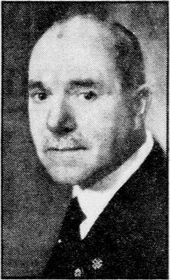Ernst August Schwebel
Ernst August Schwebel , also Ernst-August (born March 23, 1886 in Winningen , Rhine Province ; † October 31, 1955 in Marburg ) was a German administrative lawyer and judge.
Life
Schwebel studied law at the Kaiser Wilhelms University of Strasbourg . In 1904 he became a member of the Corps Rhenania Strasbourg . He was a member of the Confessing Church .
After participating in the First World War, he worked as a district administrator in the Meisenheim district from 1919 and in the Marburg district from 1924 . He was a signatory of the Berneuchen book written by Karl Ritter in 1926 and, as a result, a member of the Evangelical Michael Brotherhood at the beginning of October 1931 , a memorial plaque in the Kreuzkapelle of the University Church of Marburg with the 22 donors.
In 1927 he was made an honorary senator of the Philipps University of Marburg , which later explicitly disapproved of Schwebel's behavior during the National Socialist era . Politically he was active from 1930 to 1933 in the Conservative People's Party under Gottfried Treviranus and Kuno von Westarp . As a conservative party member, he complained about the strengthening of the NSDAP in his region and saw himself exposed to campaigns by the party, including as the alleged "grave digger of the three-house basalt industry". In 1934 he was appointed to the Prussian Higher Administrative Court in Berlin . His successor in the Marburg district was Hans Krawielitzki .
During the German occupation of the Netherlands from 1940 to 1945 he was the representative of Reich Commissioner Arthur Seyß-Inquart in the province of South Holland and The Hague in the occupied Netherlands. In this position, his first employee was Erich Eichelberg, who later became the senior city director of Celle . He was also instrumental in Operations Manna and Chowhound in late 1944.
At the same time he was Reich judge at the Reich Administrative Court from 1942 to 1945 . In 1945 the Allies took him into automatic arrest .
In 1948 he was acquitted of a war crime charge in the Netherlands in a court martial in Delft in 1944 . The Allied Control Council assessed his membership in the Confessing Church as resistance, although the documents of his activity as the representative of the Reich Commissioner do not adequately exclude his involvement in war crimes.
He was a witness in the Nuremberg trial of the major war criminals . He was questioned by the defense attorney of his former superior Arthur Seyß-Inquart, Gustav Steinbauer , about his activities in the Netherlands and reported on the situation in the Netherlands shortly before the end of the war, but also on Seyß-Inquart's conversation with General Walter Bedell Smith . He reported on "Menschenfangaktion" (able-bodied in the Reich) and preparations for scorched earth in the Netherlands. His statements were interpreted as an advocacy for Seyss-Inquart's innocence.
His superior Arthur Seyss-Inquart was sentenced to death. Released from witness custody in 1947, he was managing director of Christian Emergency Aid in Marburg from 1948 to 1952.
His brother-in-law was Hans Dombois with whom he temporarily lived in Potsdam and who was also active in the Confessing Church.
literature
- Bärbel Holtz (ed.): The minutes of the Prussian State Ministry 1925–1938 / 38. Vol. 12 / II. (1925-1938) . Olms-Weidmann, Hildesheim 2004. ISBN 3-487-12704-0 ( Berlin-Brandenburg Academy of Sciences [Hg.]: Acta Borussica . New series .)
Web links
- Literature by and about Ernst August Schwebel in the catalog of the German National Library
- Ernst-August Schwebel's CV on the website of the University of Marburg
- Schwebel, Ernst August in the Hessian biography
Individual evidence
- ↑ Nora Andrea Schulze (Ed.): Responsibility for the Church III. Stenographic notes and transcripts from Regional Bishop Hans Meiser 1933–1955. Volume 3: 1937. Vandenhoeck & Ruprecht, Göttingen 2010, ISBN 978-3-647-55765-6 , p. 1080.
- ↑ Kösener Corpslisten 1960, 100 , 221
- ^ Association for Hessian History and Regional Studies: Journal of the Association for Hessian History and Regional Studies . 1976, p. 215 ( google.de [accessed on March 1, 2020]).
- ↑ Rudy J. Koshar: Social Life, Local Politics, and Nazism: Marburg, 1880-1935 . UNC Press Books, 2014, ISBN 978-1-4696-1713-8 , pp. 195 ( google.de [accessed on March 1, 2020]).
- ^ Hessian yearbook for national history . 1972, p. 299 ( google.de [accessed on March 1, 2020]).
- ^ Historical Commission for the Grand Duchy of Hesse, Hessian Historical Commission Darmstadt: Sources and research on Hessian history . Self-published by the Hessian Historical Commission Darmstadt and the Historical Commission for Hesse, 1985, ISBN 978-3-88443-152-8 , p. 880 ( google.de [accessed on March 1, 2020]).
- ^ A b Christian Zentner, International Military Tribunal: The Trial of the Major War Criminals before the International Military Tribunal, Nuremberg, November 14, 1945-1. October 1946 . Reichenbach, 1948, ISBN 978-3-7735-2508-6 , p. 252 ( google.de [accessed on March 1, 2020]).
- ^ A b Johannes Koll: Arthur Seyß-Inquart and the German occupation policy in the Netherlands (1940-1945) . Böhlau Verlag Vienna, 2015, ISBN 978-3-205-79660-2 , p. div . ( google.de [accessed on March 1, 2020]).
- ↑ Stephen Dando-Collins: Operation Chowhound: The Most Risky, Most Glorious US Bomber Mission of WWII . St. Martin's Publishing Group, 2015, ISBN 978-1-4668-7915-7 , pp. div . ( google.de [accessed on March 1, 2020]).
- ↑ The Trial of the Major War Criminals before the International Military Tribunal, Nuremberg, November 14, 1945-1. October 1946 . 1948, p. 255 ( google.de [accessed on March 1, 2020]).
| personal data | |
|---|---|
| SURNAME | Schwebel, Ernst August |
| ALTERNATIVE NAMES | Schwebel, Ernst |
| BRIEF DESCRIPTION | German administrative lawyer and judge |
| DATE OF BIRTH | March 23, 1886 |
| PLACE OF BIRTH | Winningen |
| DATE OF DEATH | October 31, 1955 |
| Place of death | Marburg |
